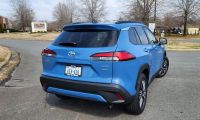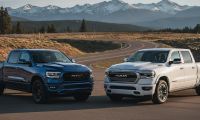This past month, Tesla's Model 3 finally broke free of its production constraints. In the past three months in the U.S. alone, Tesla has sold about 26,000 Model 3 luxury sedans. This makes the Model 3 the top-selling luxury car model in the United States, surpassing the sales of luxury car models from automakers like Lexus, Cadillac, BMW, Mercedes Benz, Audi, Porsche, and BMW. Interestingly, America's taxpayers are now providing direct subsidies to the wealthy buyers of this model. Why?
There is a simple reason. In both of the last two tax bills, one crafted primarily by Democrats and another almost entirely by Republicans, the law allows for a tax credit of up to $7,500 for certain green cars. The Model 3 qualifies for the full amount of this deduction. The original idea was that since electric vehicles cost more, and since almost nobody seems to want one (97.4% of Americans opt not to drive a green car of any type, electric or otherwise), the taxpayers should help support the wealthy folks who buy luxury electric cars. What few saw coming, or admitted to seeing, was that the most popular electric car would be so popular. It was hard to miss. Tesla bragged of having hundreds of thousands of reservation holders before the car was even released.
Despite Tesla's many public proclamations that the Model 3 would be "mainstream," its pricing is not mainstream by any sane definition. The car starts at about $49,000 and its newest trim can cost more than $80,000. By contrast, a Honda Civic Hatchback, which is almost identical in size, starts at about $21,000.
When the most recent tax law was being used in Washington as the latest way to divide the nation, Nancy Pelosi (D. CA), the House Minority Leader called the tax plan, "Monumental, brazen theft from the American middle class and every person who aspires to reach it." She pointed out that 83% of the tax bill's benefits went to the wealthiest 1% of Americans. Her counterpart in the Senate, Bernie Sanders (I. VT), said of the tax plan that included payments of up to $7,500 to wealthy Tesla shoppers, "What this legislation is about is fulfilling the promises, Republican promises, made to wealthy campaign contributors. There is a reason why the billionaire class provides hundreds of millions of dollars in campaign contributions to Republicans, and now it's payback time."
Not every Tesla shopper will qualify for the tax benefit. Some will have so much annual earned income that the Alternative Minimum Tax may preclude them from enjoying the credit fully or at all. However, if you are retired and wealthy or if you are a trust-fund recipient, the chances are good you will enjoy the tax credit. Chat with your trust administrator or your family's tax attorney to learn more. Just remember that your total wealth does not preclude you from getting this tax credit, just a high earned income in the present tax period.
Tesla includes a section on its sales site promoting the tax benefits. Also, you should know that there is presently a cap on the number of vehicles that can be sold by each manufacturer with the tax credit. Tesla will soon have to start to phase out the tax credit unless Congress changes the plan and extends Tesla's tax credit for wealthy buyers.
Now if you are worried about the tax credit expiring, or you think you may earn too much to qualify, don't despair! There is another Tesla tax loophole just for you! And this one is for Tesla's most expensive model. Even the Tesla trims costing over $130,000 qualify for the tax credit. We'll let the video below explain that second way to dodge some taxes. Some folks just can't seem to decide which Tesla Model to get in order to maximize their tax benefits. Hurry in to get yours. And don't forget to tell your buddies at the Country Club about this sweatheart of a deal.
Set Torque News as Preferred Source on Google












Comments
You can't have it both ways
Permalink
You can't have it both ways John. Either it is a car that you compare prices to a Honda civic, or only for country club millionaires. During Tesla's recent IR conference call, it broke the news of the top 5 trade-ins for Tesla Model 3, with no particular order specified:
BMW 3 Series
Honda Accord
Honda Civic
Nissan Leaf
Toyota Prius
Also there are some holes in the notion that federal subsidies are still going to the rich. The first being that because Tesla has already sold over 200,000 BEVs, Tesla buyers will lose the full $7,500 credit by the end of this year (unless the law is changed) dropping to $3750 for the first half of 2019 and $1875 for the second half of 2019. The state subsidies are similarly limited for the rich, depending on where you live. California has changed its rebate program by taking income levels into consideration. As of November 1, 2016, California residents with individual annual incomes of $150,000 or more ($300,000 for a joint return) no longer qualify for any state plug-in vehicle rebates. People with low incomes, on the other hand, can qualify for an additional $2,000 rebate for both full EVs and plug-in hybrids.
The majority of the people (like me) who got the federal and state rebates were through new car leases, where a $40K EV could be had for $250 a month or less. Which is far removed from having the middle class paying for super rich people's new EV toys. But with Tesla (and soon GM) losing their federal support, EVs will be a harder sell for both leasing and buying.
But I didn't compare the
Permalink
In reply to You can't have it both ways by DeanMcManis (not verified)
But I didn't compare the Model 3's price to a Civic. I contrasted it. The point is that the Civic is the size of a Model 3 but has a price affordable for almost every new car buyer.
You can similarly contrast
Permalink
You can similarly contrast the price of a $200,000 Bentley with a $30,000 Dodge Charger of similar size, but it doesn't address the value that attracts people to pay it's higher price. It is more relevant to compare the value of cars in the same market, especially if you are looking to understand the need for federal subsidies. For the Model 3, a far better car to look at is the BMW 330e, which in addition to being similar in size to the Model 3, they both start at the same price, and offer similar performance, and have similarly costly options. As of Jan 1st 2019, the federal tax credit for the Model 3 will be $3750, compared to the BMW 330e's tax credit of $4,005.
I'm not sure what the
Permalink
In reply to You can similarly contrast by DeanMcManis (not verified)
I'm not sure what the confusion is. My point is that the Tesla Model 3, which ranges in price from roughly $49K to $80K is an expensive vehicle. I contrast that with the Civic, a high-volume, easily recognizable car model costing much less money and often considered a mainstream affordable vehicle. A comparison of two vehicles would illustrate similarities. The BMW330e is a comparable vehicle to the Model 3, not a vehicle which offers a good example as a contrast.
Very biased Telas hit piece
Permalink
Very biased Telas hit piece with lots of factual errors.
The tax credit was enacted to jump start an industry and encourage people to purchase more fuel efficient cars. Characterizing it as a payment to rich people to purchase electric cars is total BS. These types of incentives are used in many countries to drive industries or change behaviors. Without the incentive and/or without Tesla driving the electric car industry, US car companies would find themselves in a continually shrinking market as more and more global cities ban gas and diesel powered cars. Yes some of the $7500/vehicle goes to wealthy people buying high priced cars. The subsidy phases out when a company produces 200,000 vehicles - not mentioned in your article? You also go great length to imply that the credit is targeted at trust fund babies (e.g. the rich) since they will not be impacted by AMT, Again, please research first - the credit is not subject to AMT so anyone with a total tax liability for the year of $7500 can get a full credit. Someone with less tax liability can get a partial credit.
One of the interesting facts about the Model 3 is that current Honda and Toyota owners are in the top 5 trade-ins for a Model 3 so people who drive more economy oriented cars (less rich?) are taking advantage of the tax credit, and/or willing to pay more for an electric car. This is in total contradiction to your thesis. Fact not BS.
The deduction you mention that is much more costly to the average taxpayer is the section 179 deduction which you incorrectly attribute to Tesla. Please take the time to understand what you are writing about. That deduction applies to many different types of business equipment, including trucks and SUVs. In terms of "cars", that deduction applies to anyone buying an SUV with a Gross Vehicle Weight of 6000 lbs, and includes most of the large SUVs, Expeditions, Tahoes, Escalades, Range Rovers and Model X Teslas... The Section 179 deduction was designed to drive investment in business assets. Its not a deduction for the rich nor does it have anything specifically to do with Tesla. Tesla is just pointing out that their Model X qualifies for the deduction if used for business. Seems like a good marketing tactic.
Taking money earned by one
Permalink
In reply to Very biased Telas hit piece by Peter R. (not verified)
Taking money earned by one person and giving it to another, in less polite circumstances, is known as theft. No different than being robbed in a back alley by, at least, an honest thug. One can equivocate, ad infinitum, but the inconvenient truth remains.
OK, so the story is way off
Permalink
In reply to Very biased Telas hit piece by Peter R. (not verified)
OK, so the story is way off base, but you agree that "Yes some of the $7500/vehicle goes to wealthy people buying high priced cars." Specifically, the top-selling luxury car in America. With regard to the phase-out, paragraph six covers that and it has a supporting link to a very detailed article on the subject. I understand that the GVW tax deduction applies to cars other than Tesla's Model X. Of course it does. The video at the bottom of the story is pretty clear on how it works.
1) The $7500 tax credit still
Permalink
1) The $7500 tax credit still applies if you are under the AMT rules.
2) In the US, gas cars are subsidized by about $12,000 in fuel costs over their lifespan, so a $7500 credit, actually saves the taxpayers money directly; plus there are the additional savings for air quality related health issues.
3) Electricity is produced locally, not imported from a foreign country. Electric cars don't fund terrorism.
Thanks for your comments Blue
Permalink
In reply to 1) The $7500 tax credit still by Blue Dragon (not verified)
Thanks for your comments Blue Dragon. Not sure I can agree with the gasoline-powered cars subsidies, particularly when applied to green cars of similar size to the Tesla Model 3, cars like the 58MPG Hyundai Ioniq and 55 MPG Toyota Prius. However, I can tell you that about 11% of Canada's electric power generation is exported to the United States. The two countries have traded power for over a century. The U.S. is a net gasoline exporter. Here are some links:
----------https://www.eia.gov/todayinenergy/detail.php?id=36352--------https://www.eia.gov/todayinenergy/detail.php?id=36332---------I do agree with you that "electric cars don't fund terrorism."